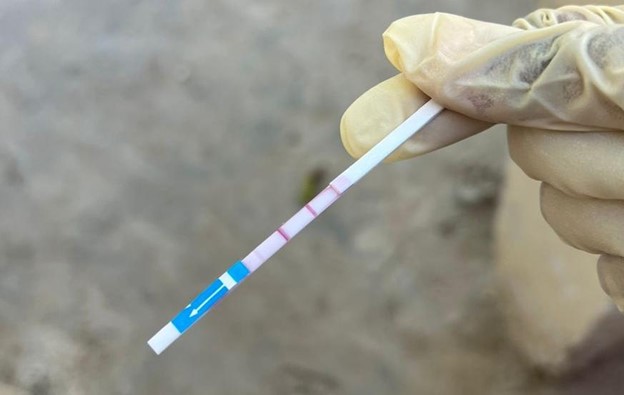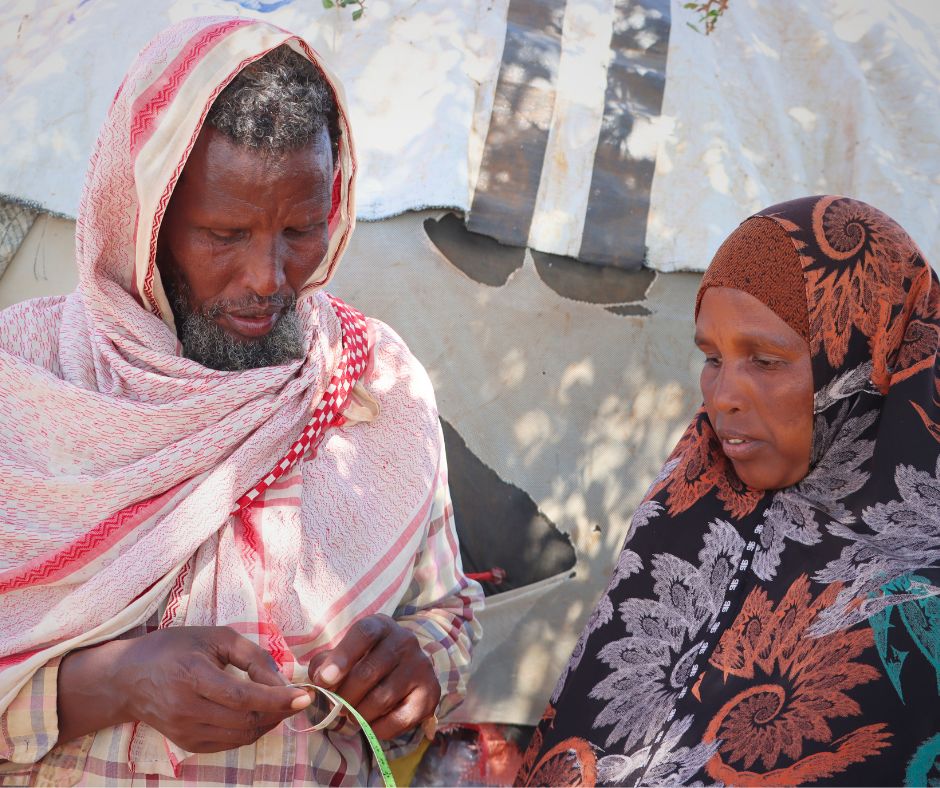Fatuma cradled her feverish daughter as they arrived at Afgoye General Hospital. Her two-year-old, weakened by days of severe diarrhea and vomiting, had grown too frail to even cry. Fatuma feared the worst: cholera. For this young mother and many others like her in Afgoye, a small village just outside Mogadishu, cholera was more than a word—it was a daily terror, claiming the lives of children and elders across the region.
Fatuma’s story is not unique. Since 2017, cholera has recurred in Somalia, entrenched as an endemic threat. The situation worsened late 2023, when severe floods contaminated water sources, triggering yet another outbreak. By mid-2024, Somalia had recorded more than 12000 cholera cases and over 120 deaths reported, according to the UN OCHA Somalia June report. The Afgoye district saw an alarming attack rate.

The cholera crisis didn’t occur in isolation. Ongoing drought, widespread malnutrition, and additional disease outbreaks have weakened the public health system. The result is a deeply fragile humanitarian landscape that demands urgent intervention.
Recognizing the gravity of the situation, the Juba Foundation (JF), a partner of the Caafimaad Plus Consortium, with funding from the British Embassy Mogadishu, launched a rapid response program in Afgoye. Their approach centered on the Caafimaad Plus framework, a consortium of frontline humanitarian organizations working to tackle both immediate medical crises and long-term health challenges in Somalia.
Through this initiative, the Juba Foundation deployed two dedicated outreach teams to the hardest-hit villages in Afgoye, such as HawoTako, Aytiro, Baalguri, and Sabiid. These teams set up Oral Rehydration Points (ORPs) and provided life-saving interventions, including water chlorination, hygiene promotion, and critical treatment for cholera patients. Fatuma’s daughter was among those referred for urgent care.
“I thought I was going to lose her,” Fatuma shared. “But the outreach team found us, and they brought her to the hospital. Now, she is playing again, eating, and smiling.”
In Afgoye, cholera’s spread was largely attributed to the contamination of water sources. Flooding from the Gu rains left standing pools of water, where cholera bacteria flourished. The Juba Foundation’s efforts to chlorinate water sources across the district were crucial in breaking the disease’s transmission cycle. In places like Hawatako, community health workers treated wells and other water sources, ensuring they were safe for drinking.

“Chlorination is vital,” explained Yusuf Mohamed Awdhere, a health worker with JF. “When we chlorinate the water, it kills the bacteria and stops the spread. But it’s more than that. We are teaching families how to do this at home, so they don’t rely on us every time.”
Beyond chlorination, JF teams worked with local hygiene promoters to distribute hygiene kits—which included soap, water purification tablets, and handwashing stations. They also conducted mass hygiene campaigns, teaching communities about safe water storage, proper food handling, and the importance of regular handwashing. These efforts dramatically reduced new cholera cases, which fell from 160 per week to just 10 within a matter of weeks.
The health crisis in Somalia is multifaceted. Diseases like cholera, acute watery diarrhea (AWD), and even malaria are exacerbated by the high rates of malnutrition. Malnourished children are especially vulnerable; they lack the strength to recover from infections. According to the Food Security and Nutrition Analysis Unit (FSNAU), 1.6 million Somali children face acute malnutrition this year alone. Cholera and malnutrition often go hand-in-hand, each worsening the other.
The Juba Foundation, through Caafimaad Plus, has been addressing this dual crisis by not only treating cholera but also tackling its root causes. The outreach teams don’t just distribute supplies—they educate. By teaching mothers like Fatuma how to spot the early signs of dehydration and malnutrition, and by providing access to ORPs in their own villages, JF is giving communities the tools to protect themselves.
“We have learned so much from these teams,” said Fatuma. “Now, I know how to keep my children healthy. I even started telling my neighbors about what I’ve learned.”
To complement these efforts, JF has also installed 20 additional toilets in the most affected areas, all equipped with handwashing stations. These facilities are part of a broader effort to improve sanitation and stop the spread of waterborne diseases.
The international community’s role in supporting these interventions cannot be understated. The European Union Humanitarian Aid (ECHO) and FCDO funding have enabled organizations like the Juba Foundation to deploy quick and effective responses in Lower Shabelle Region. This collaborative approach between NGOs, local governments, and international donors has been instrumental in containing outbreaks.
Caafimaad Plus, which operates in multiple districts across Somalia, aims to build sustainable health systems that can withstand future crises. The program focuses not only on cholera but also on strengthening overall healthcare infrastructure, training local health workers, ensuring access to clean water, and promoting long-term sanitation practices.
As the number of cholera cases continues to fall in Afgoye, there is a sense of cautious optimism. The immediate crisis may be subsiding, but the work is far from over. Somalia’s Ministry of Health, supported by organizations like JF and partners within Caafimaad Plus, is building a foundation for long-term resilience. The country still faces challenges from malnutrition, recurring disease outbreaks, and water scarcity, but there is hope in the progress being made.
For Fatuma and her daughter, that hope is tangible. “We were scared. But now, we feel safer,” she said. “We know there is help, and we know what to do.”
As Somalia continues to confront its health challenges, stories like Fatuma’s are a reminder of the power of coordinated action, education, and community empowerment in saving lives.







